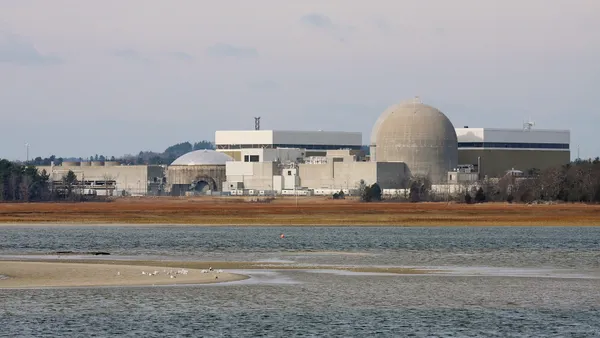Dive Brief:
- The Illinois Commerce Commission on Dec. 2 ordered Ameren Illinois to restore full retail net metering to residential and small business customers who have installed rooftop solar since Oct. 2.
- Ameren has said for months that rooftop solar generation reached 5% of the total power it distributed by October, a milestone that the company said required it to reduce its net metering tariff for customers with new solar arrays from the full retail rate for excess power delivered to its system to net metering of only the cost of energy, which is worth about half as much as the full retail net metering.
- A coalition of environmental groups joined with an association of small solar installation companies to oppose Ameren's moves, setting off a regulatory struggle that got the attention of other utilities as well as the wider solar industry.
Dive Insight:
The battle over continued net metering at the full retail rate in Illinois came down to an argument over the language in the state's 2017 pro-solar development legislation, the Future Energy Jobs Act, and simple arithmetic used to figure the percentage of power that customer solar arrays deliver to the utility's distribution system compared to the power the utility delivers to customers at peak demand.
Ameren's calculations figured the total amount of excess power it received from home solar arrays in 2019 divided by the total amount of power it delivered, excluding the power generated by retail energy suppliers. In other words, Ameren insisted the denominator (bottom number) in its percentage calculation include only the power it generated, not power generated by independent producers, which Ameren also delivered over its system. The subsequent calculation indicated the solar generators accounted for a little over 5% of the power Ameren itself provided.
Environmental groups wanted to exclude "community solar" in the numerator (top number), that is, large solar projects that individual customers subscribe to and receive a portion of the output, because the 2017 solar development statute distinguished between rooftop and community solar.
And they argued the amount of power considered in the calculation should include all power delivered, not just power generated by Ameren. The Illinois Commerce Commission partially rejected Ameren's arguments but did include community solar output as part of the total solar capacity on its distribution system.
The commission's ruling, using an "apples to apples" comparison, includes all solar power delivered into Ameren's system — both rooftop and community — as a percentage of all power, whether generated by Ameren or another company, supplied to satisfy peak demand. And that calculation finds Ameren's percentage of solar penetration well under the 5% threshold needed to adjust the net metering rate.
One of the five members of the commission dissented, arguing that the issues raised by Ameren should be dealt with by state lawmakers. There was also a concurring opinion by a second member who, while agreeing with the order, said the commission's determination of what the lawmakers meant when they wrote the net metering legislation did not address the thicket of arguments Ameren raised when it switched its tariff from full retail net metering to supply net metering only at the beginning of October.
The commission's order gives the company just 21 days to restore its former tariff guaranteeing full retail net metering to any customer who installed a system after Oct. 2 and those who install solar going forward. Also, the order requires the company to "make whole," that is, pay those customers who installed solar after Oct. 2 and who have not been receiving full retail net metering.
Ameren has not decided whether to appeal the commission's ruling and in a statement warned that as net metering expands, those customers who cannot afford rooftop solar will ultimately pay a larger percentage of the company's costs to maintain its distribution system as delivery rates change.
The solar industry and environmental groups celebrated the decision.
"We are grateful to the Illinois Commerce Commission for following through on our state's commitment to creating jobs, protecting consumers and expanding clean energy," said Nakhia Morrissette, central region director and counsel for SEIA. "The Illinois solar market has had a tumultuous year as a result of the state's worsening financial cliff. Ameren's attempt to dismantle net metering would have effectively stifled a solar market that's already down, adding even more uncertainty for businesses in the region."
"This small victory for a stable clean energy market is a big relief for the thousands of workers whose jobs hinge on fair solar policy," said Will Kenworthy, Vote Solar regulatory director, Midwest.
The ICC order "confirms that Ameren's decision to end retail net metering in October was premature and unlawful." said Nikhil Vijaykar, staff attorney at the Environmental Law and Policy Center. "Fair access to retail net metering is a key ingredient in Illinois' steady clean energy transition."
"This decision is good for Illinois' energy future and especially for the southern part of the state in Ameren territory," said Toba Pearlman, NRDC's senior attorney. "Illinois must continue to invest in clean, rooftop and community solar and ensure that customers are fairly compensated for the clean energy that they produce."













